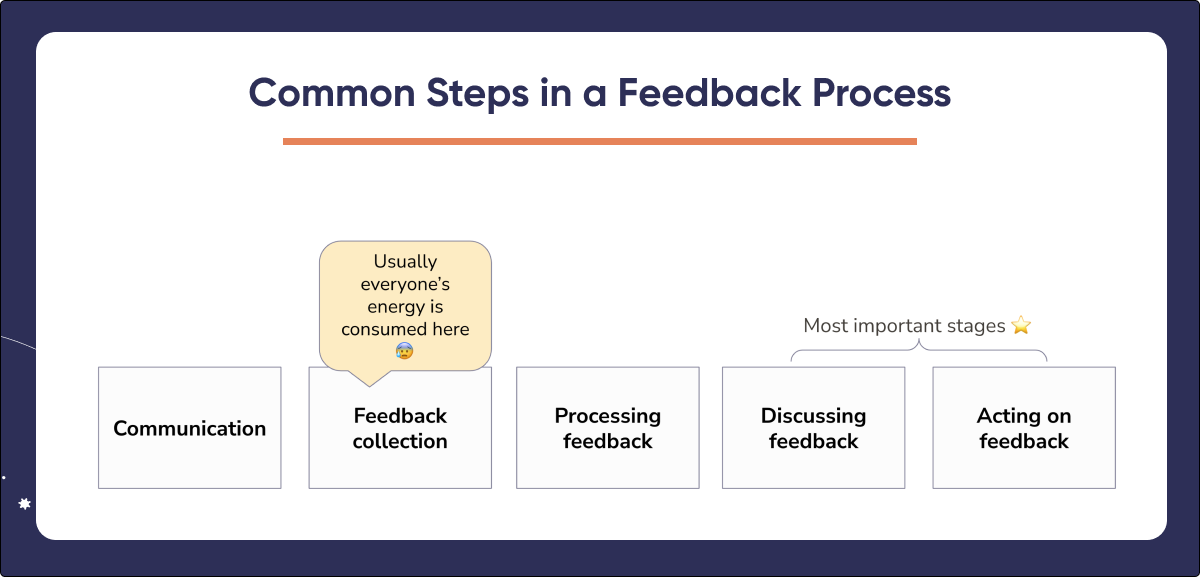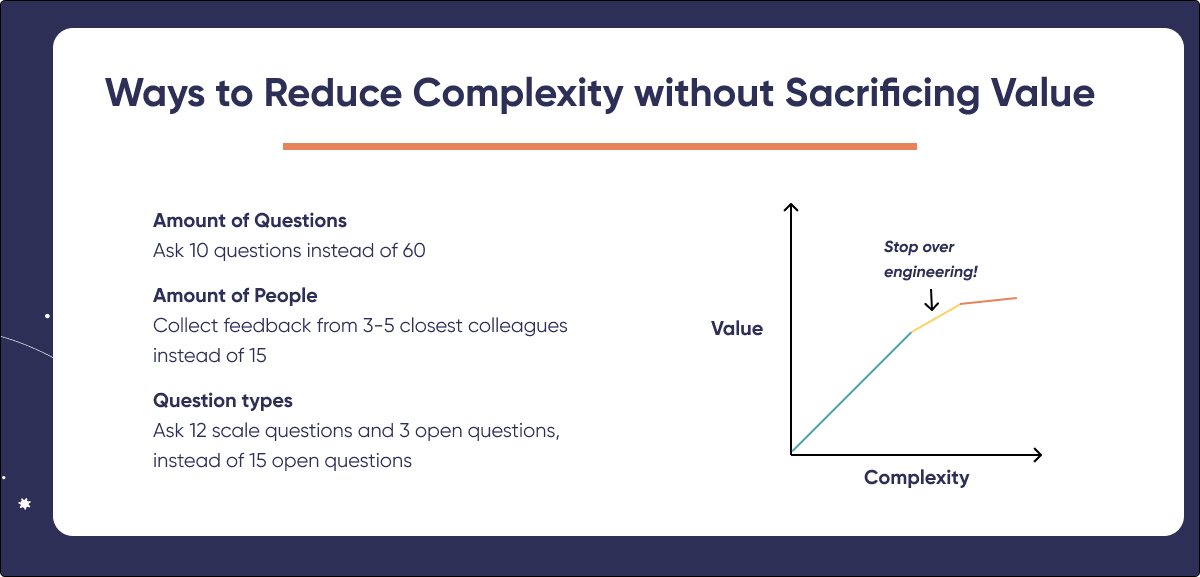30 Employee Review Questions for Better Performance Reviews
January 31, 2026Stop boring performance reviews. Use these 30 employee review questions to spark meaningful conversations and actually improve team performance.
The right employee review questions can lead to honest talks, reveal hidden problems, and boost performance. If you’re looking to level up performance reviews in your company, this article is for you.
Most performance reviews still rely on old-fashioned models. You sit with your employee, read off a list of standard questions, and go through the motions. They give safe answers. You tick boxes. Nothing really changes.
While much can be said about the review itself (and the need for timely feedback), the questions we ask, as leaders and managers, matter just as much.
The right employee review questions can lead to honest talks, reveal hidden problems, and boost performance. If you’re looking to level up performance reviews in your company, this article is for you.
Why Are Employee Reviews Important?
Employee reviews matter for both workers and managers. For employees, they help clarify expectations, give credit for wins, and show a clear path for growth. For managers, reviews show how the team is doing and highlight where support is needed.
But annual reviews often don’t work. By the time you meet, the feedback is outdated. Issues that could’ve been fixed earlier have already caused damage.

The fix? Regular check-ins with focused, useful feedback.
Modern performance reviews need:
- Frequent talks (biweekly, monthly, or quarterly)
- Clear, practical questions
- Future-focused discussions, not just past problems
Below are 30 employee review questions I’ve fine-tuned over the years. They lead to real conversations and real results.
Listen to Your People
Track engagement and wellbeing continuously and ensure leaders take action on all levels of the organization – effortlessly in Slack or MS Teams.
Learn More30 Employee Review Questions
These questions have worked in real reviews with hundreds of employees, and they spark real talks.
General Performance (6 Questions)
Start here to build the base. These focus on results, not just being busy.
1. What accomplishments are you most proud of since our last review?
A positive start. It lets employees talk about their wins.
2. Which goals did you exceed, meet, or miss this period?
Focuses on results, not effort. Get straight to the point.
3. What obstacles prevented you from achieving your objectives?
Knowing the blockers helps you offer better support.
4. How do you measure success in your current role?
Reveals if your idea of success matches theirs.
5. What would you do differently if you could restart this review period?
Encourages honest thinking and personal growth.
6. How has your performance impacted the team’s overall success?
Connects the dots between individual and team performance.
Company Culture (6 Questions)
Culture shapes how people work. These questions check for alignment and any issues.
7. How well do your daily actions reflect our company values?
Links performance to what the company stands for.
8. What company values resonate most with you and why?
Shows what matters to the employee.
9. How do you contribute to a positive work environment?
Looks at how they support the team culture.
10. What aspects of our company culture do you find challenging?
Helps catch early signs of a cultural mismatch.
11. How do you handle situations that conflict with company values?
Tests their ethics and judgment.
12. What suggestions do you have for improving our workplace culture?
Gives employees a voice in shaping the environment.
Role and Responsibilities (6 Questions)
Clear roles lead to better performance. These help you understand how they see their work.
13. Which parts of your job energize you most?
Spot areas of strength and passion.
14. What responsibilities feel unclear or overwhelming?
Find out where they need more help or clarity.
15. How has your role evolved since you started?
See how the job has changed and how they’ve grown.
16. What tasks do you wish you could do more or less of?
Understand their preferences for possible role changes.
17. How do you prioritize competing demands on your time?
Check their time and task management.
18. What additional responsibilities would you like to take on?
Opens the door for growth and stretch opportunities.
Teamwork and Communication (6 Questions)
Success depends on working well with others. These explore how they collaborate and communicate.
19. How effectively do you collaborate with colleagues across departments?
Reviews teamwork across teams.
20. What communication methods work best for you?
Helps improve future feedback and updates.
21. How do you handle disagreements or conflicts with team members?
Tests their conflict resolution skills.
22. Who would you want on your team for your next big project and why?
Shows who they trust and how they see team strengths.
23. How do you prefer to receive feedback from your manager?
Makes your feedback style more effective.
24. What could your colleagues do differently to help you succeed?
Finds out if there are broader issues slowing performance.
Development and Growth (6 Questions)
Growth is key in performance talks. With these questions, remember to look ahead, not just back.
25. What skills do you want to develop over the next six months?
Keeps the focus on growth, not mistakes.
26. Are you ready for a more challenging role today?
Directly explores promotion or growth readiness.
27. What learning opportunities would benefit your career goals?
Helps match learning with long-term goals.
28. How can I better support your professional growth?
Makes managers accountable for supporting development.
29. What career path interests you most within our organization?
Useful for career planning and retention.
30. What would make you consider leaving this role or company?
Finds possible risks before they become problems.
How to Make Performance Reviews More Effective
After setting up review systems at several companies, I’ve learned what works. Here are proven ways to make performance reviews more useful:
Focus on Behaviors That Matter
Don’t try to measure everything. Focus on behaviors that match your values. I suggest using the “Start, Stop, Continue” method:
- Start: What helpful actions should they begin doing?
- Stop: What behaviors might be hurting performance?
- Continue: What’s already working well?
Track Goal Completion
Reviews should connect achievements to set goals. Ask, “Did this person meet their goals—and how?”
Avoid vague answers. Stick to results you can measure.
Ask Future-Oriented Questions
Reviews should guide what happens next. Ask:
- “Is this person ready for a bigger challenge?”
- “Would I want this person on my team again?”
These keep the focus on potential, not just the past.
Make Feedback a Routine
Yearly reviews aren’t enough. Include feedback in regular 1-on-1s. This keeps feedback fresh and useful.
Ongoing feedback helps stop problems before they grow.
Provide Actionable Insights
Every review should lead to action. Don’t overwhelm with too much info. Instead, break it into clear next steps.
Use plain language. Employees should know what to do after the meeting.
Reduce Unnecessary Complexity
Too many companies over-complicate feedback. They add too many questions or tools and lose focus.

Best practices for simpler reviews:
- Ask 10 strong questions instead of 60 weak ones
- Get feedback from 3–5 key coworkers, not everyone
- Mix scale ratings with a few open-ended questions
More isn’t better. Stick to what matters.
Conclusion
Strong employee review questions can boost your company’s performance, if they lead to the right conversations at the right time.
These 30 questions have helped hundreds of managers hold better reviews. They focus on growth and give clear paths forward.
Remember: the goal is to spark change. Keep your reviews simple, focused, and future-ready. Your team will thank you. And your business will benefit.
Want to make your review process easier? Teamspective helps managers run better reviews with AI-powered insights and automatic feedback collection.



